 JEROME ANDRE
.
March 05, 2024
.
Electric Vehicle Features
JEROME ANDRE
.
March 05, 2024
.
Electric Vehicle Features
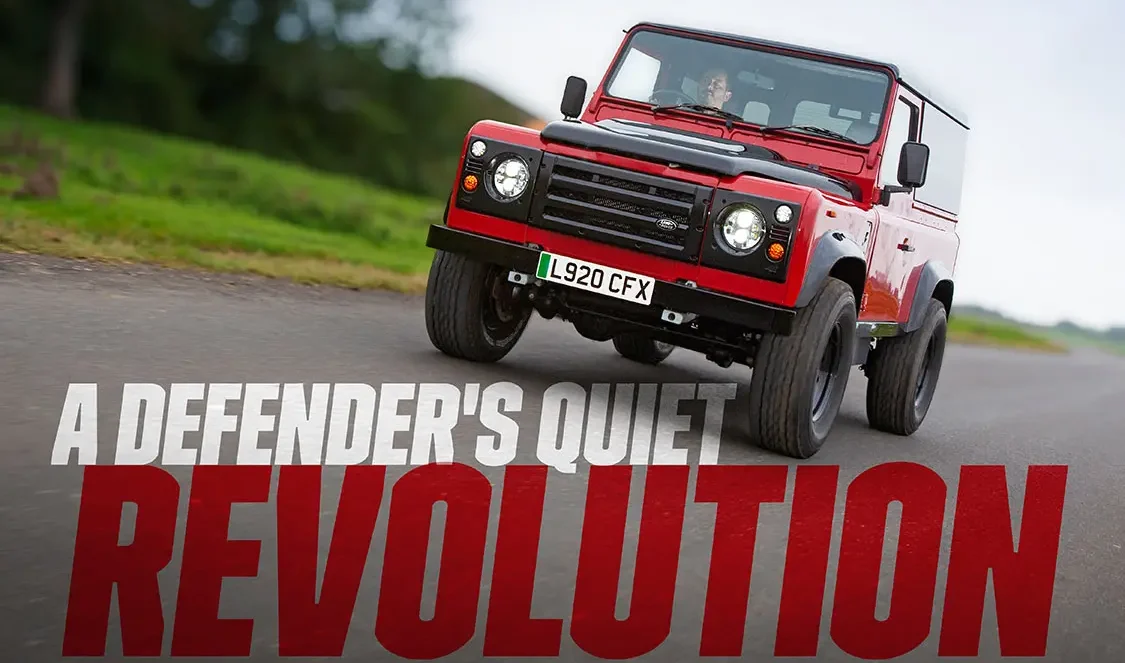
Photos by Jerome Andre
In the sun-dappled Bristol, UK, development workshop, a superb 1993 Arrow Red and Santorini Black Defender sits quietly. This isn’t a preamble to another of its rugged adventures over rocky terrains; instead, we are here to discover its journey into an utterly new frontier—electrification.
To the Land Rover purists and adventurers, the Defender’s hearty diesel grunt or the V-8’s rumble is music to the ears. But let’s imagine it combining forces with the silent power of electric drive synonymous with unbridled exploration across both serene and unforgiving landscapes.

In a world where progress often comes at the cost of nostalgia, a novel electric conversion system juxtaposes the cherished classic Defender with cutting-edge electric technology, heralding an unexpected alliance. Electrification, particularly within the sacred halls of classic motoring, might initially ruffle a few feathers, and the concept of transplanting a serene, electric powertrain into the brawny, mud-slinging Defender could well be perceived as downright iconoclastic to the devout aficionados.
But delve a smidge deeper, beyond the potential sacrilege, and the notion of an electric Defender tantalizingly begins to unfurl its appeal. Imagine, if you will, the silent torque surging, empowering it to glide over hills and obstacles with newfound grace, all whilst eschewing the traditional mechanical cacophony.
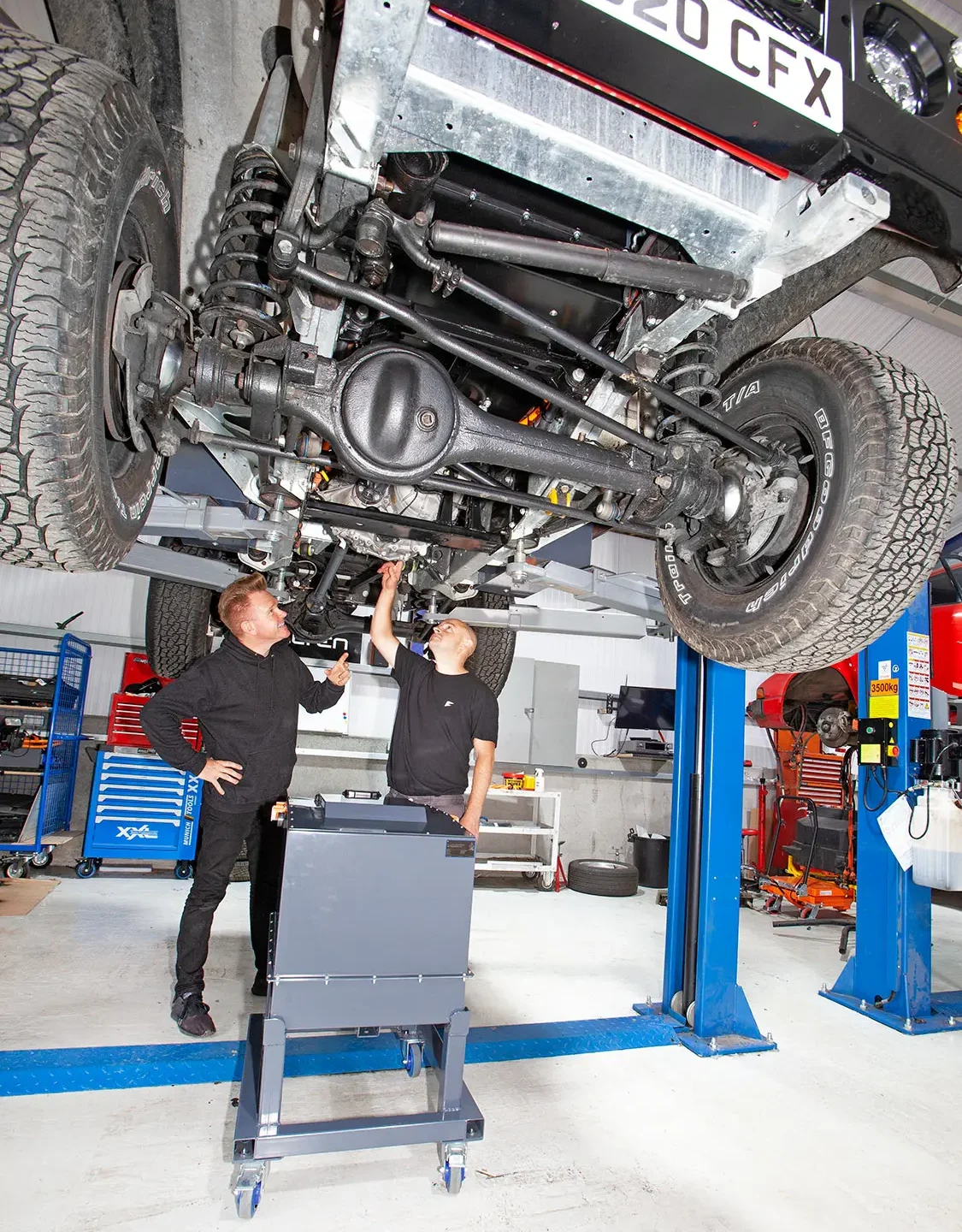
Enter the team at Fellten (meaning Lightning in Welsh), composed of brilliant minds and impressive craftsmen. Based in Bristol, the company has made a name for itself around the world by designing and producing conversion systems for the industry and Hollywood studios – and now, they’ve set their sights on the mighty Landy.
At its core, Fellten designs, engineers, manufactures, and distributes OEM and aftermarket battery packs, electric motors, and complete bolt-in, plug-in conversion systems for Porsches and Classic Minis (approved by MINI). Its footprint spans the UK, Australia, North America, and Europe, where its commitment to excellence shines through as it sets industry standards for quality, safety, reliability, and production volume. The company’s upcoming South Gloucestershire production facility is poised to deliver hundreds of battery packs per year to OEMs and conversion systems to its approved international network of conversion specialists.
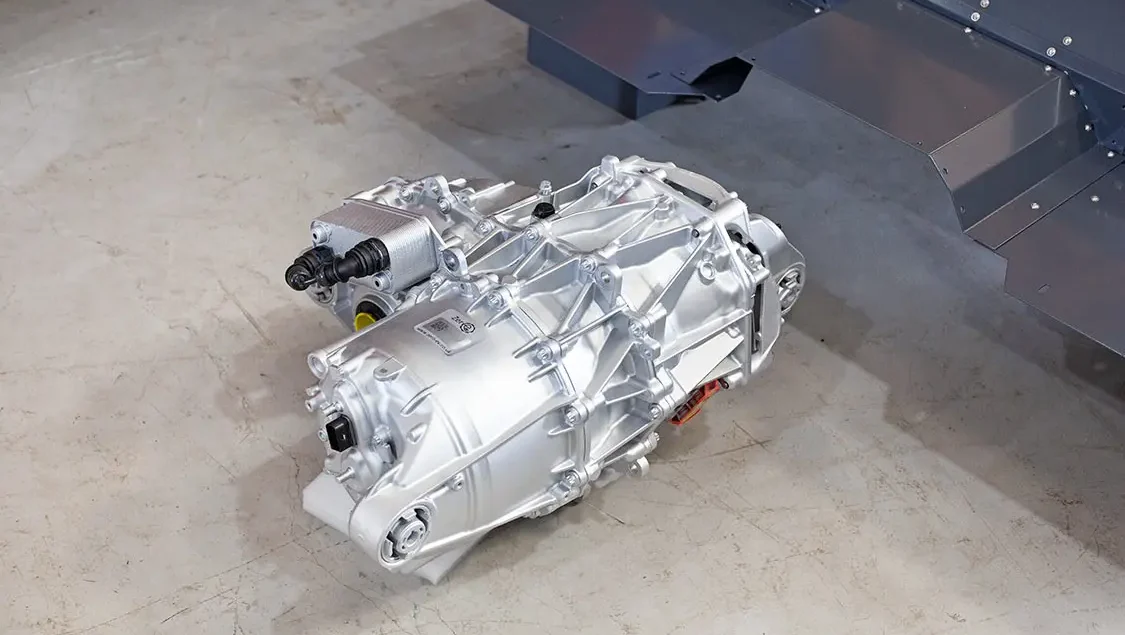
Fellten’s system consists of the amalgamation of a new Tesla Model 3 rear drive unit and Fellten’s universal battery pack, flaunting an astonishing 55kWh capacity. The ‘UBP55E’ has been developed to fit most engine bays originally fitted with a straight-6, V-6, or V-8, but the requirement was also that it fits any Defender. This pack is available from Legacy EV individually or as a conversion systems bundle.
The Model 3 powerhouse replaces the whole internal combustion drivetrain: a 2.5L 200 TDI block, gearbox, and transfer case. This is ultimately a better engineering system than coupling a compact electric motor to the original transmission, not least because it’s a great deal more compact. That’s important when one of the goals has been to maintain the original Defender’s overall mass and its weight balance, so inherent in the character of how it handles off-road or towing. The Tesla drive unit, position lengthwise, sits dead in the middle of the length of the 90, where the G- and T-box combo was: There is no need for a transfer case since the mighty motor delivers 100% of its torque from standstill to max speed!
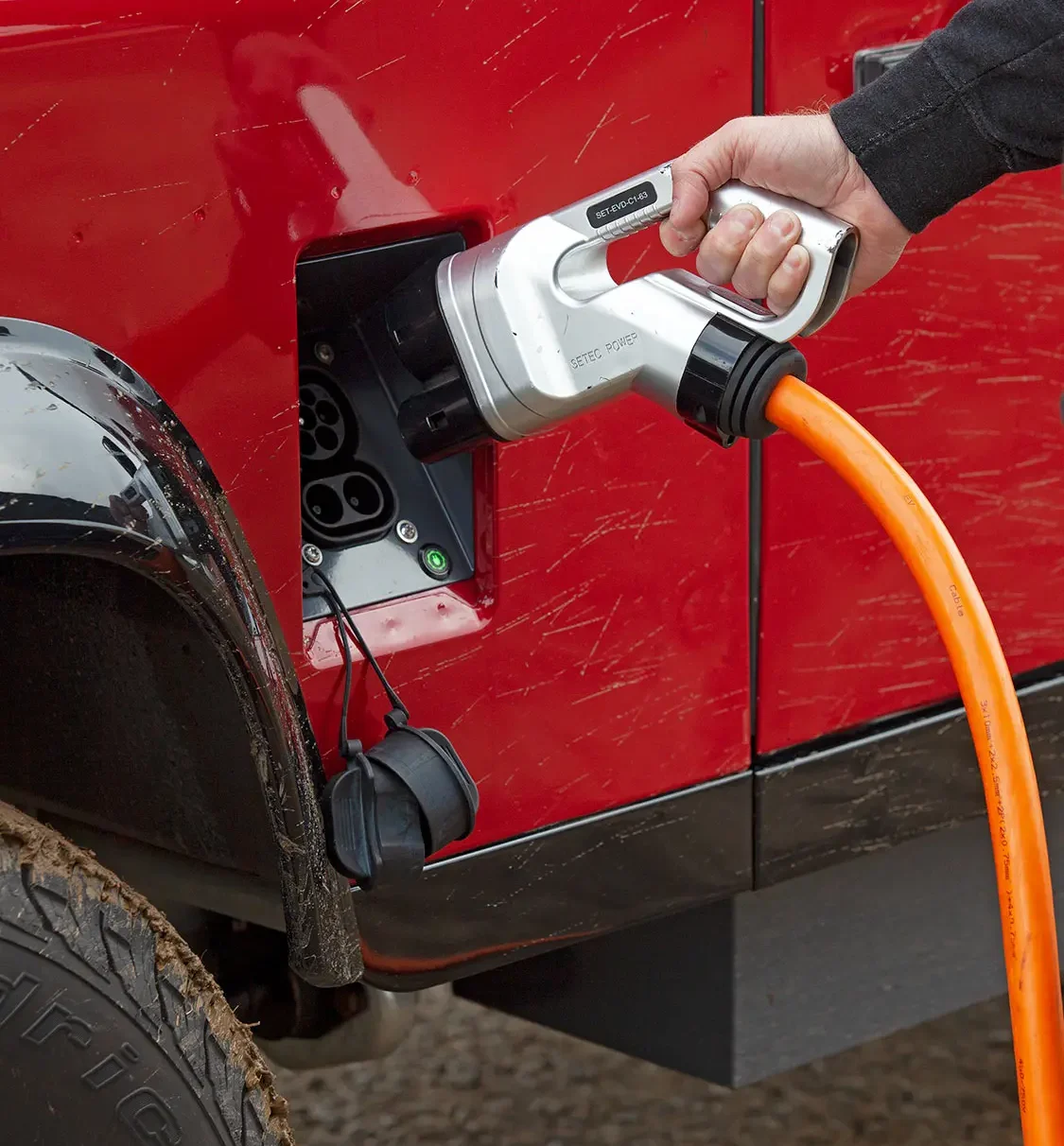
The battery offers a formidable peak discharge of 330kW along with an industry-first CCS rapid charging at a rate of 70kW. This means you can top up your battery from 20 to 80% at any rapid charger in around 35 minutes. Last, its IP67 protection safeguards its intricate technology from the British weather’s repertoire, from drizzles to downpours, whilst offering a low and steady center of gravity to the 90.
Just like other EVs, when you drive the Fellten Electric Defender, you always leave home or your workplace with a full “tank.” This means you typically only need to charge during longer trips. For daily sub-200 miles commutes, simply plug it in every night, much like you would with your mobile phone and leave the next day fully charged.
Designed with both pragmatism and finesse, this fully weatherproof “universal” battery pack enthralls with its discreet but robust capabilities, encapsulating battery management, high-voltage pre-charge circuit, contactor control, and more, all within an astoundingly compact space. All the technology is well-protected, and there are no wires, cables or piping sticking out of its steel and carbon-fiber shell.
According to Chris Hazell, CEO of Fellten, the easiest part of the build was scanning the engine compartment and components to create the 3D space for designing. However, engineers encountered several challenges, including the packaging constraints to fit the main battery box and ensuring that no modifications were made to the vehicle to stay within the regulation’s requirements.
Since there are no shortcuts in building an EV conversion system that is unobtrusive and designed to OE-level specifications, the Fellten team solved these challenges using CAD to design and create a secondary 55kWh battery pack that replaces the whole seat box. Like the rest of the system, both battery packs come with a three-year warranty
Crucially, the whole back of the 90 is unaltered by the conversion, meaning 100% of the back remains stock and can still receive all the goods one needs to carry or seats with passengers. Towing capacity is also similar to the original, though depending on load, the power usage will rise, just like fuel consumption rises on a diesel or V-8 Defender.
A Defender purring quietly with the might of electric power does more than just preserve a classic; it propels it into the future.
Fellten, and the US’s market leader in aftermarket EV applications, Legacy EV, recently announced a groundbreaking partnership, marking a new era for the e-conversion industry in the United States. Leveraging Fellten’s advanced conversion solutions and Legacy EV’s leading position in US-wide distribution and dedicated training, the partnership is poised to bridge the past’s automotive legacy with the future of electric propulsion. Legacy EV will serve as the exclusive distributor for Fellten’s state-of-the-art components, e-motors, battery packs, and its complete bolt-on, plug-in conversion systems throughout the USA. The deal also encompasses coverage for Fellten’s unique three-year warranty. To ensure optimal product utilization and consumer satisfaction, Legacy EV will harness its vast network, providing rigorous training for technicians across all 50 states.
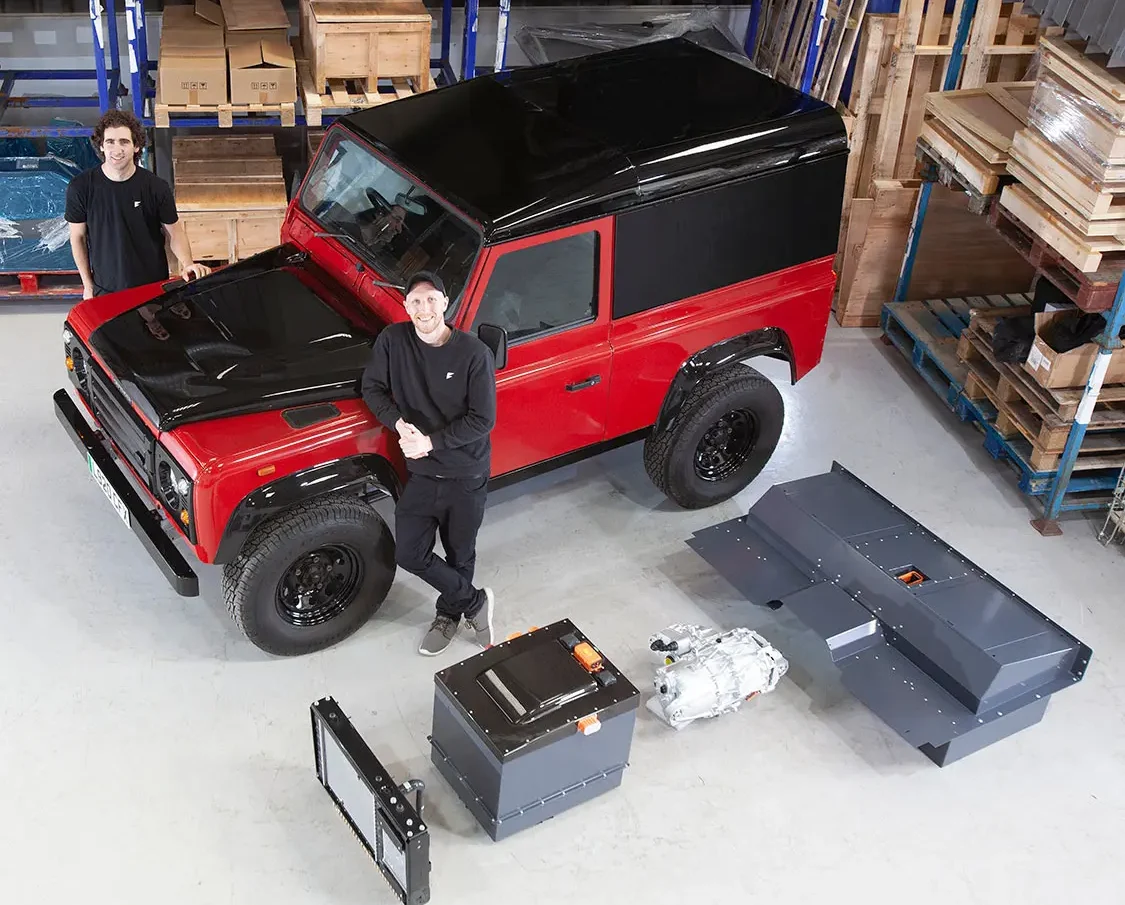
When engineering this particular 90, the team opted for a brand-new galvanized chassis, which was not a requirement. In fact, several specialists in the UK and worldwide opted to focus solely on the system installation as long as the base vehicles are sound with a solid chassis. Some of them even perform the conversion in just one week, followed by a full week of testing.
Specialists already offer this conversion system with more joining the ranks upon following Fellten’s dedicated High Voltage virtual and in-person training at their training studio.
To meet strict government bodies’ requirements around the globe, there are no required modifications to be made to the body or the chassis – not even a single hole that needs to be drilled.. That’s good for purists of originality, of course, but more importantly, it means there’s nothing you couldn’t return to standard here or update and evolve in a few years.
Upon ignition, the electric Defender offers an experience that is uncannily serene yet familiar. The absence of the traditional 200 TDI growl is filled with a gentle electronic hum, and as the vehicle eases into motion, it reveals a driving experience that is both novel and comfortably recognizable. Its regenerative braking system mirrors the engine braking of its diesel predecessor, and one-pedal driving becomes second nature swiftly, marrying the ease of electric driving with the traditional, robust Defender character.The Defender easily reaches 90 mph and a 0-60 time of 6.5 seconds. Compared to a diesel-sipping 200 TDI, the equivalent performance feels absolutely effortless, thanks to the electric motor’s instantaneous at 300lb-ft, upgradable to 600Nm (442lb-ft) and currently at 150hp -that could be pushed up to 220kW (300hp).
The 90’s regenerative braking system operates impressively, mimicking the engine braking encountered in a diesel Defender on a low gear. It becomes intuitively easy to adapt to within a brief moment. It becomes quickly apparent that the primary use of the right pedal suffices, reserving the actual brake for emergencies or halting at traffic signals. Engaging the go pedal absolutely outpaces a new supercharged V-8 Defender!
To commence the drive, activate the ignition key and choose D on the panel located on the dashboard. From there, operate it like any other EV – or an automatic Defender. Rest assured, the distinctive character of the Defender, complete with its iconic sounds, vibrations, and rattles, remains intact.
Now, the elephant in the room is that you lose the 200 TDI sound. True, but that’s about the only trade-off. Then again, ‘filling up’ the electric Defender 90 cost less than a pit stop at…Starbucks!
The Defender, often likened to a mobile brick, does not offer the range at higher speeds that one might experience with the aerodynamically sleek Tesla Model 3. When traveling above 50mph, the majority of the energy is consumed in navigating air around the Defender’s front. Nonetheless, the vehicle’s shape less significantly impacts the range in urban settings, on the farm, or within woodland areas.
A global consumption estimate for the electron-fed Defender hovers around 500W per mile in practical use. This is double the energy usage of the latest premium compact EVs – mirroring how a traditional internal combustion engine Defender demands twice the fuel of a smaller, lighter vehicle.
Conceivably, gentle cruising without aggressive acceleration can achieve better than 500W/mile, though, during our trial, such restraint was challenging due to our allure while overtaking any vehicle slower than a sporty hatchback or trying to find the BF Goodrich Trail-Terrain T/A’s traction limits. These have been brilliant in the rough stuff, by the way.
In rugged terrains, the Fellten 90 introduces another advantage. The engineers have crafted modes, akin to the Terrain Response, including a specialized Crawl mode. Once activated, the accelerator pedal’s response adjusts, providing more nuanced control and gradually permitting additional torque for climbing over rocks and obstacles. This feature proved beneficial during the 90’s testing through a muddy, narrow path and a wet, sloping, grassy track.
As businesses ponder the viability of electric conversions, the Fellten system unfolds as an enticing prospect, providing a potent yet user-friendly technology. As stated by Chris, the FL10 UBP55E was developed to facilitate businesses in seamlessly adding electric conversions to their portfolios without entanglement in complex installation processes. Beyond the technological offering, Fellten extends its hands in training and comprehensive support, paving a pathway for the classics to glide into the electric future, equipped and empowered.
Embracing this electric renaissance requires a $62.000 investment (retail price, fully installed and tested). Yet, this financial commitment is not merely an ecological statement but a savvy, long-term economic strategy, particularly compelling for those navigating through the stringent emissions norms of urban environments. The electric Defender promises substantially lower running costs at a mere $5.50 to charge from 0 to100% whencompared to $36 to travel the same distance in a diesel 90. That is an 85% savings.
Moreover, the elimination of numerous mechanical components significantly reduces maintenance costs, rendering the upfront investment astute, especially in an era gradually gravitating towards zero-emission mandates. Also, the conversion-to-electric industry is anticipating there could be incentives for converting an internal combustion engine sooner than later, as it is already the case in some countries around the globe.
Last, 60 grand plus a donor Defender is still significantly less than what Land Rover will charge when they eventually offer the current generation ‘L663’ Defender in a full-electric configuration. More importantly, retrofitting lets you keep your own iconic and beloved classic Defender. The only major drawback is you will have to do without your Landy for two weeks while Fellten-certified installers work their magic.
This electric Defender doesn’t simply traverse the landscapes; it traverses eras, embodying an amalgamation of cherished heritage and forward-thinking innovation. It invites us to ponder, to explore, and ultimately accept that the future of classic motoring can, indeed, be electrifyingly bright. A Defender purring quietly with the might of electric power does more than just preserve a classic; it propels it into the future, creating a beguiling blend of the historic and the modern in a package that’s ever-so-tantalizingly British.
Electric 1993 Defender 90 hardtop (originally a 2.5L 200 TDI)
Wheels, Tires & Brakes
Body
Interior
We use cookies to enhance your browsing experience, serve personalized ads or content, and analyze our traffic. By clicking "Accept All", you consent to our use of cookies. Visit our Cookie Policy for more info.
Notifications
Share Link